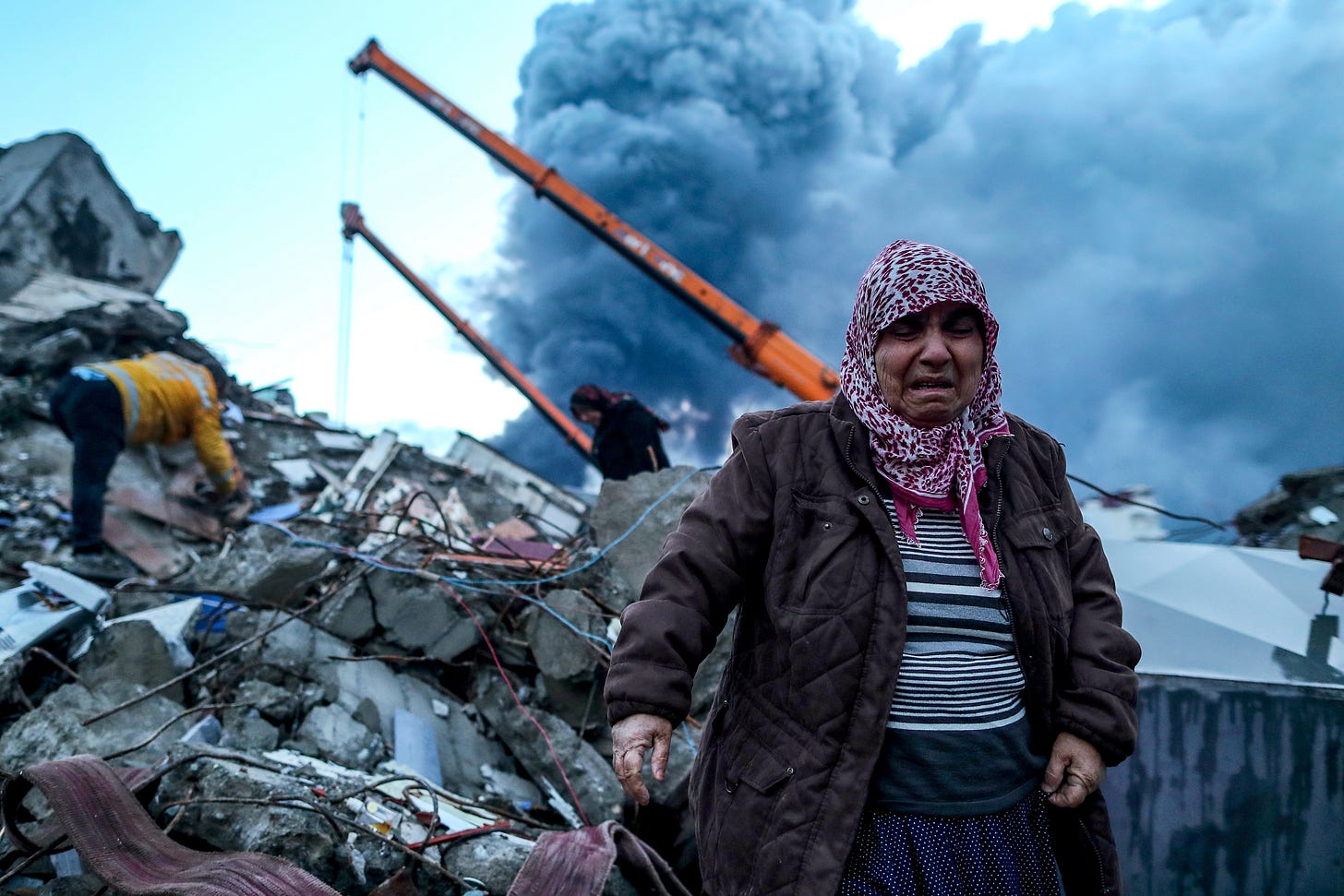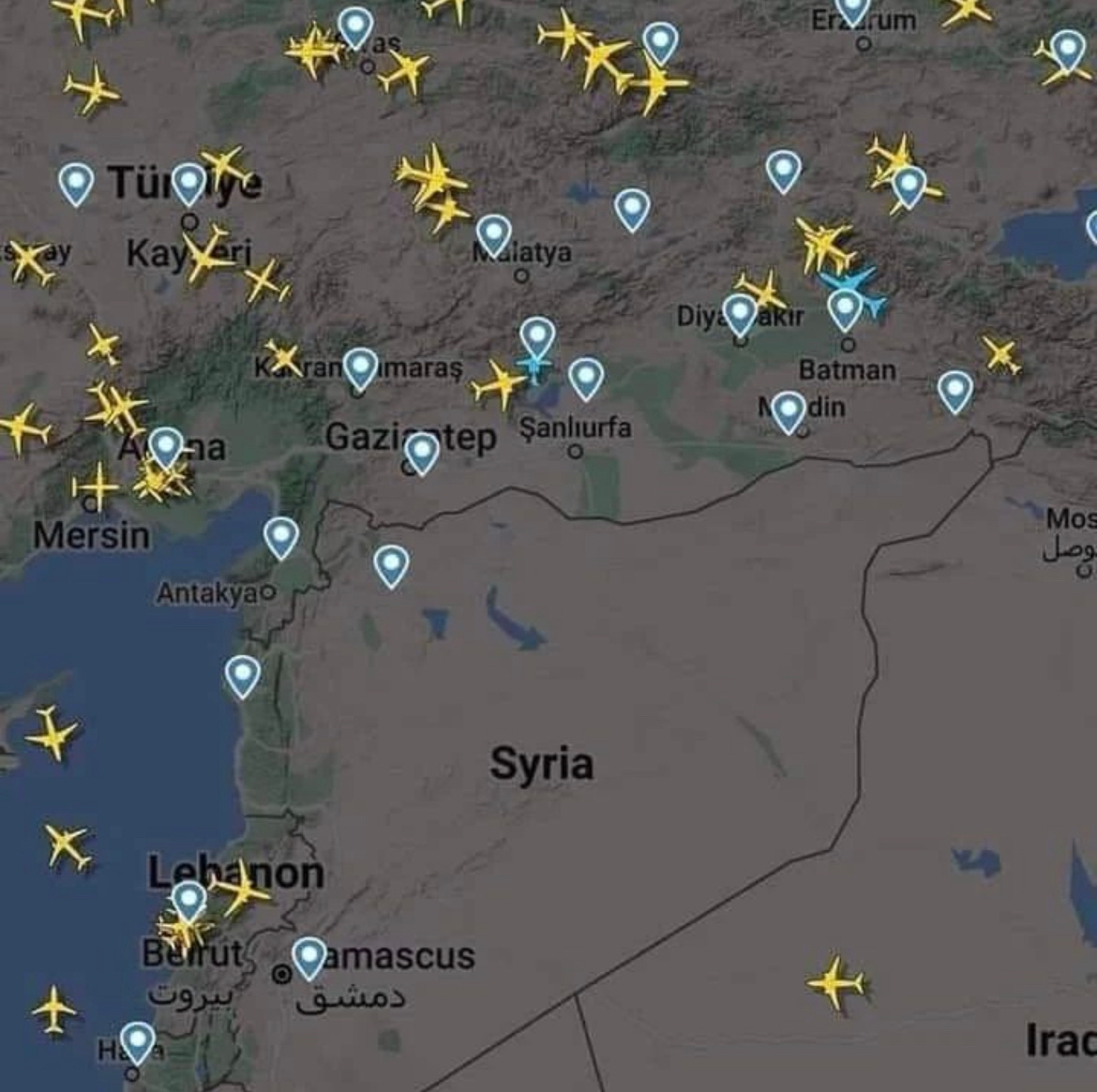Earthquakes used to be an opportunity for diplomacy
The response to Syria's disaster is heavily politicized, but rival states once used humanitarian relief as a way to mend ties.
There’s been an earthquake in the Levant. On Monday, a magnitude 7.8 tremor struck Gaziantep, Turkey; it was felt as far south as Egypt. Five thousand people have died in Turkey and Syria, according to official statistics, and the death toll could rise to 20,000 as buildings continue to collapse and rescue operations dig up more victims.

The disaster heaped misery upon misery on Syria, which has been split by years of civil war between unrecognized rebel governments and a paranoid, isolated bunker state. With humanitarian organizations struggling with wartime political barriers, it’s unlikely that Syrians will receive the timely response they need.
Many Arab friends of different political persuasions have shared this screenshot from a flight tracker. Unlike in other disasters, which prompted a steady stream of aid flights, the skies above Syria have remained empty.
The sad state of Syrian earthquake relief reflects global problems. The same dynamics of politicized humanitarian aid played out during the coronavirus pandemic, and they show no signs of stopping in the near future.
Not only has “great power competition” gotten more heated, but economic warfare is far more accepted as one of its tools. States have learned that they can wreck other peoples’ livelihoods through international legal barriers, then blame the ensuing suffering on their enemies’ corruption and incompetence.
In other words, the strong can play a game of “why are you hitting yourself” against the weak. Anything that leaves the weak begging for aid or the ability to spend their own money serves these ends.
It didn’t have to be like this.
There was once a time when earthquake relief transcended — and even helped mend — political divisions. From the late 1980s to the early 2000s, political adversaries extended a hand to each other several times during severe natural disasters.
After an earthquake struck Soviet Armenia in 1988, the Soviet Union welcomed in an international aid effort. The effort overcame not only one but two nasty political divisions. Soviet authorities had not accepted U.S. aid since the beginning of the Cold War, and the region was in a state of near civil war as Armenians and Azeris fought the Soviet state as well as each other.
A decade later, historic rivals Greece and Turkey began “earthquake diplomacy.” Mutual aid for disaster relief became the beginning of a broader diplomatic warming. The relationship has deteriorated once again, and earthquake relief has once again become a way to revive diplomacy.
A few years after that, the 2003 earthquake in Iran completely destroyed the old city of Bam, killing tens of thousands. The Bush administration — which had added Iran to the “Axis of Evil” only a few months before, and was not-so-secretly considering a war — offered aid. U.S. military planes flew to Iran for the first time since the 1980 hostage crisis, carrying aid rather than bombs.

It’s hard to imagine the 1988 or 2003 earthquake diplomacy playing out during a similar situation today.
In fact, one doesn’t have to imagine. During the coronavirus pandemic, pretty much every aspect of the international response was politicized: access to information about the early outbreaks, pharmaceutical patents, access to basic medical supplies, potential sanctions relief, and even different countries’ choice of vaccine.
When rival countries did offer each other emergency aid, their tone seemed to reflect nasty gotchas rather than the spirit of humanitarianism.
Geopolitical fault lines run through Syrian society. Most of the country is controlled by the prewar government of Bashar al-Assad, who brought Iranian and Russian forces to bomb major cities into submission. The northern border regions are run by rebels under Turkish protection, and the Northeast is governed by Kurdish-led, U.S.-backed rebels.
The Assad government has tried to strangle any aid outside its control. Russia has used its UN Security Council veto to threaten aid flows into rebel-held areas, instead demanding that UN aid go through the government. Of course, that turns aid into a favor the government can withhold from its opponents. Sometimes the aid is straight-up stolen by well-connected cronies.
Turkey has similarly used humanitarian as an arm of policy. In order to both stop migration and crush Kurdish rebellion, the Turkish government has designated large parts of northern Syria as a “safe zone.” Turkish forces expel Kurds, then Turkish-backed aid organizations move other refugees into those Kurds’ former homes.
Add to the mix U.S. sanctions. Washington insists that the sanctions do not apply to food and medicine, but the 2020 sanctions law says that its goal is to deter reconstruction aid and investment to government-controlled areas. Most of Syria is supposed to remain an economic basket case dependent on short-term aid — and in turn, U.S. banking sanctions make that aid harder to deliver.
The latest catastrophe is only reinforcing these patterns. The Syrian foreign ministry continues to insist that the central government should be the provider of relief for “all Syrians in all territory of Syria,” while the U.S. State Department says it would be “ironic” to “use this [earthquake] as an opportunity to reach out to a regime that has brutalized its people.”
Much of the international aid to Syria will have to flow through Turkey. The closest Turkish airports to the border have been severely damaged. As the infrastructure slowly comes back online, the “prioritization of need” will present “complications,” expert Emma Beals pointed out. There will likely be political pressure to prioritize aid flights intended for Turks, especially with anti-Syrian racism rising in Turkish society.
The suffering of Syrians and others is sometimes seen as a result of the U.S.-led world order breaking down. But when it comes to humanitarian aid, the cruelty is a result of states playing by the rules. The powers-that-be have gotten better at using national sovereignty and sanctions laws as a pretext to immiserate civilians — and pretend someone else is responsible.



